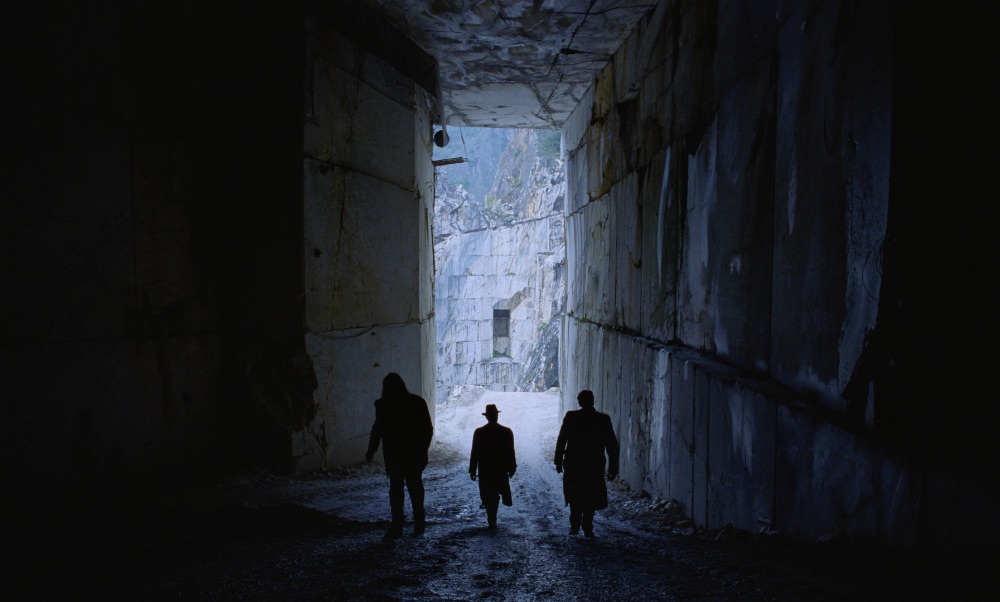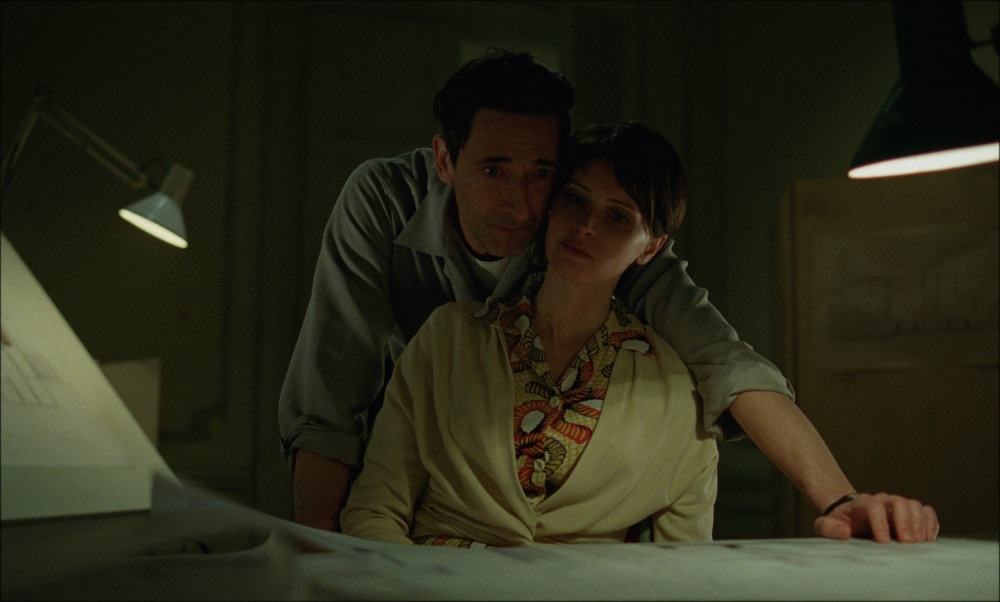The Brutalist, about a Hungarian-Jewish architect who survives the Holocaust and rebuilds his life in postwar America, is a film as stubborn and as challenging as its protagonist. It mirrors his journey, one of trauma fueling inspiration and of struggle between art and money, between artist and patron. It is a rebuke to a collapse of customs and traditions, as its protagonist’s works are. It is as monumental as those works.
This is a story of immigration that lets us know from the get-go that it will not go gently, as so many movies do, on one the greatest upheavals a person can experience: starting over in a new culture far from home. One of the first images director Brady Corbet gives us — the first of many with a similar starkness and lack of sentimentality — is a dizzying, upside-down look at the Statue of Liberty as Adrien Brody’s (The Grand Budapest Hotel, Midnight in Paris) László Tóth arrives on a refugee ship in New York harbor. It’s an unsettling upending of a cinematic cliché, and it comes on the heels of the film’s opening moments: the screen black, loud noises and bangs amidst shouts. I thought at first that we were in a bomb shelter, the cries those of fear, but we’re merely belowdecks with refugees excited to have reached their destination. It sets a disquieting tone for all that is to come in László’s tale, when we’re frequently as on edge as he is.

After a brief, lonely interlude in New York City, László, separated by war from his wife and teenage niece, arrives in Philadelphia to settle in with seemingly the only other family he has left, his cousin, Attila (Alessandro Nivola: The Many Saints of Newark, Selma), and to work in his cousin’s furniture business. Corbet — who wrote the screenplay with his regular writing (and life) partner, Mona Fastvold — is unhurried in depicting László’s years-long climb back to the massive architectural work for which he was celebrated in prewar Europe, eventually via the patronage of wealthy industrialist Harrison Lee Van Buren (Guy Pearce: Bloodshot, Mary Queen of Scots), who commissions László to build a community center in honor of Van Buren’s deceased mother. This job is the canvas upon which the great trials of László’s new life will take place, as he eventually must battle Van Buren to maintain his artistic vision, which incurs some violent pushback. At the same time, László also falls prey to the hedonism life in America and the messy joy sheer survival prompts while also enduring bigotry as an immigrant, which ramps up once his wife, Erzsébet (Felicity Jones: On the Basis of Sex, Rogue One: A Star Wars Story), and niece, Zsófia (Raffey Cassidy: Allied, Tomorrowland), are finally able to join him in Pennsylvania.
Harsh realities of American culture simmer in László’s story — Brody’s performance is extraordinary, full of flinty anger, palpable melancholy, and repressed sorrow — and also in the meta reality of The Brutalist: we so rarely see films like this one anymore. Uncomfortable, complex adult dramas, where they exist at all nowadays, have retreated to streaming services, often as series to be snacked upon or binged at home. But Corbet — with his third feature, after 2015’s The Childhood of a Leader and 2018’s Vox Lux — has pulled out all the stops to remind us what cinema used to be and, one senses the desperate urgency of subliminal appeal, could be again. Lol Crawley’s austere cinematography is gorgeously showcased in a high-resolution widescreen format called VistaVision, a precursor to IMAX developed in the 1950s to better compete then with television and doing the same job again now. It lends an extra sensation of the epic to the three-and-a-half-hour runtime, every minute of which feels justified and zips by; the retro presentation comes complete with a musical overture opening the film and a 15-minute intermission at a satisfying point.

All this is possible because Corbet independently financed the film — there were no studio bosses with their fingers in the pie, meddling to make it more commercial — and produced it on a budget of under $10 million, which is shockingly little for a historical drama. (Last year’s Oscar-nominated historical dramas Oppenheimer and Killers of the Flower Moon cost about $100 million and $200 million, respectively.) Nothing here feels as minimalist as László’s concrete brutalism — except maybe the careful parsimony with which Corbet reveals László’s secrets — but spending what amounts to only Hollywood pocket change was certainly key to getting this daringly original film made in the form we got it in.
The Brutalist, then, demands our full attention as a moviegoing experience, demands to be seen on the biggest screen possible — some presentations are in IMAX, some in 70mm; film nerds will debate which is better, but both are terrific (I saw it in 70mm; might go for a second watch in IMAX). Corbet has been developing the film for years, but though it has been in the works since before the Covid pandemic, the actual shooting was done in early 2023, and the result feels like a reprimand for how we as a culture have let serious movies be diminished, a trend that stay-at-home orders only exacerbated, with their concomitant rush to make movies available to watch at home. The Brutalist reminds us what we have lost in our subdued traumatized present that, in many way, echoes László’s world of the past.
more films like this:
• There Will Be Blood [Prime US | Prime UK | Apple TV | Paramount+ US | Paramount+ UK]
• The Power of the Dog [Netflix]

























Admittedly I’ve totally ignored anything about this movie until now. Just had no clue what it was.
Now you’ve sold me on it, but I still wont see it until streaming. Like most movies nowadays.
Plus, 3 1/2 hrs? wow. yeah definitely a home viewing. Probably over multiple days.
If you watch five minutes a day, you should finish the movie just in time for the Oscars, and it will help you get over any withdrawal symptoms you feel if TikTok goes away.
There really is something to be said for sitting in the dark with no distractions and immersing yourself in a cinematic experience. Maybe give it a try?
When I become an eccentric millionaire, I’m going to buy a television that’s larger than the apartment I live in now.
I would settle, myself, for a TV that is larger than the double bed I sleep in. I think that would be amazing.
I agree but at this length I’ll do it at home.